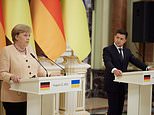Russia’s new Baltic gas pipeline must not be used as a ‘weapon of the Kremlin’ says Merkel
Russia’s new Baltic gas pipeline must not be used as a ‘geopolitical weapon of the Kremlin’, warns Angela Merkel, as she threatens sanctions if Putin uses it to intimidate Ukraine
The Nord Stream 2 pipeline will double Russia’s natural gas supply to GermanyUkraine could lose essential gas transit fees of $1.5 billion per yearThe Ukrainian President called the pipeline ‘a dangerous geopolitical weapon’Nord Stream 2 is expected to be completed in late August or early SeptemberChancellor Merkel will leave office after almost 16 years in charge of GermanyShe affirmed future German governments would be bound to uphold sanctions
<!–
<!–
<!–<!–
<!–
(function (src, d, tag){
var s = d.createElement(tag), prev = d.getElementsByTagName(tag)[0];
s.src = src;
prev.parentNode.insertBefore(s, prev);
}(“https://www.dailymail.co.uk/static/gunther/1.17.0/async_bundle–.js”, document, “script”));
<!–
DM.loadCSS(“https://www.dailymail.co.uk/static/gunther/gunther-2159/video_bundle–.css”);
<!–
Chancellor Angela Merkel said Sunday that Germany and the US will impose sanctions on Russia if their soon-to-be-completed Nord Stream 2 gas pipeline is used to strengthen their geopolitical power in the region.
The gas pipeline is set to double Russia’s natural gas shipments to Germany, bypassing Ukraine and depriving the EU member state of essential gas transit fees of $1.5 billion per year.
Russia is already the second-largest supplier of gas to the EU behind only Norway, and Ukrainian Prime Minister Volodymyr Zelensky argued the pipeline will increase Europe’s energy dependence on Russia and Moscow’s geopolitical clout.
Zelensky said on Sunday that the gas pipeline, whose construction is expected to be completed in late August or early September, is ‘a dangerous geopolitical weapon’.
‘We view this project exclusively through the prism of security and consider it a dangerous geopolitical weapon of the Kremlin,’ Zelensky said during a joint press conference with Merkel following a meeting between the two heads of state.
While the main risks after the completion of the $12-billion pipeline beneath the Baltic Sea would be ‘borne by Ukraine’, he said, it would also be dangerous ‘for all of Europe’.
Chancellor Angela Merkel said Germany and the US will impose sanctions on Russia if their soon-to-be-completed Nord Stream 2 gas pipeline is used to strengthen their geopolitical power in the region
Merkel, who leaves office after 16 years next month, says any commitments to imposing sanctions on Russia will be binding for future German governments
Ukrainian President Volodymyr Zelensky said on Sunday that Russia’s Nord Stream 2 gas pipeline to Europe is ‘a dangerous geopolitical weapon’
Merkel said Berlin agreed with Washington that ‘gas must not be used as a geopolitical weapon, and affirmed that a Germany-US agreement specified ‘sanctions’ if gas was ‘used as a weapon’.
These commitments are ‘binding on future German governments’, she noted.
Merkel is set to leave office next month, marking the end of her almost 16-year-long leadership of Germany.
She also said she had discussed with Putin extending Russia’s transit contract with Ukraine past 2024, which if terminated would see Ukraine lose out on around $1.5 billion per year in essential gas transit fees.
‘We feel a special responsibility’ and ‘understand the big concerns that President Zelensky expressed,’ she said. ‘We take them very seriously.’
The Ukrainian leader, however, said that while he and Merkel had discussed the extension, he had heard only ‘very general things’, and declared he had initiated consultations with the European Parliament regarding the potential geopolitical fallout of the Nord Stream 2 pipeline.
The gas pipeline is set to double Russia’s natural gas shipments to Germany. This image shows the Nord Stream 2 gas line landfall facility entrance in Lubmin, north eastern Germany
Merkel said Berlin agreed with Washington that ‘gas must not be used as a geopolitical weapon, and affirmed that a Germany-US agreement specified ‘sanctions’ if gas was ‘used as a weapon
The pipeline is set to be completed in late August or early September
In addition to the pipeline issue, the two leaders also discussed Ukraine’s protracted conflict with pro-Russia separatists, which has claimed more than 13,000 lives since 2014.
Merkel voiced her desire to organise a leaders’ meeting between Russia, Ukraine, Germany and France on the situation in eastern Ukraine, which would be the first since late 2019.
Germany and France have worked to help broker a peaceful settlement to the conflict, including an often-violated 2015 cease-fire agreement reached in Minsk, Belarus.
‘That in my opinion would bring us progress, if we can work out a good agenda – our advisers should do that,’ she said.
Zelensky meanwhile said Kyiv is seeking a permanent cease-fire in eastern Ukraine, a prisoner exchange, open crossings at the line of contact and to ensure Red Cross access to the conflict zone.
He supported the idea of a meeting, but urged Kyiv’s Western partners to exert pressure on Russia in order to achieve progress in eastern Ukraine.
‘As long as there is no progress, the pressure on Russia should continue. We want to see active efforts of our Western partners,’ Zelensky said.
Merkel said she expects the next German government to ‘work in the same spirit’ with Ukraine, pushing for the country to recover its territorial integrity and enabling it to continue with domestic reforms.
![]()


